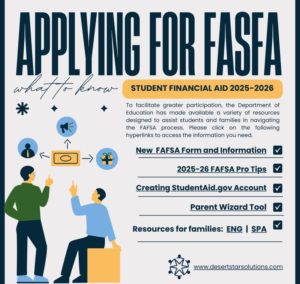Why Getting an Early Start on Your 2025-26 FAFSA Is a Smart Move
If you’re planning to attend college or vocational school during the 2025-26 school year, completing your FAFSA (Free Application for Federal Student Aid) early can significantly impact your ability to secure financial aid. The FAFSA opens in December 2024, and starting the process early can provide you with access to grants, scholarships, loans, and work-study opportunities that make education more affordable.
One of the key reasons to file early is that some forms of financial aid are distributed on a first-come, first-served basis. While federal grants like the Pell Grant are available to all eligible applicants, many state grants, institutional scholarships, and work-study programs have limited funds. Filing early ensures you’re considered for these resources before they’re depleted, maximizing your chances of receiving financial aid.
Filing early also gives you more time to ensure your application is accurate. The FAFSA requires detailed financial information, and mistakes can delay processing or reduce your aid eligibility. By starting early, you’ll have time to double-check your form, fix any errors, and ensure your application is submitted without unnecessary stress.
Another benefit of early submission is receiving your financial aid package sooner. Colleges use FAFSA information to calculate how much aid you qualify for, and an early application helps you get this information ahead of others. Knowing your financial aid package earlier allows you to make informed decisions about where to enroll and how to budget for additional expenses.
Filing early also reduces stress during an already busy senior year. Between college applications, extracurricular activities, and exams, there’s a lot to juggle. Completing your FAFSA early gives you one less task to worry about as deadlines approach, allowing you to focus on other priorities with peace of mind.
State and institutional priority deadlines are another critical factor to consider. These deadlines often come well before the federal FAFSA deadline and missing them can mean missing out on additional aid opportunities. Filing early ensures you meet these deadlines and maximize your eligibility for all available aid.
An early start also allows you to access valuable resources and support. School counselors, financial aid advisors, and FAFSA workshops are excellent tools to guide you through the process. When you start early, you’ll have time to seek help, ask questions, and ensure your application is complete and accurate.
To prepare, create your FSA ID on StudentAid.gov. Gather the necessary documents, such as your 2023 tax returns and financial information. Dependent students should also have their parents’ financial details ready. Mark the FAFSA opening date on your calendar and aim to complete your application as soon as it’s available.

Filing your FAFSA early is a proactive step toward securing the financial aid you need for your education. By starting early, you increase your chances of accessing grants, scholarships, and other funding opportunities that make your educational dreams a reality. Don’t delay—begin the process today and set yourself up for success!
Tips for Getting an Early Start
- Create Your FSA ID Now: Your FSA ID is your key to accessing and submitting the FAFSA. Creating it ahead of time will save you from last-minute hassles.
- Gather Your Documents: Have your 2023 tax returns, W-2s, and other financial information ready. If you’re a dependent student, you’ll need your parents’ information, too.
- Mark Key Dates: Add the FAFSA opening date (December 2024) to your
calendar and aim to complete the form as soon as possible. - Double-Check Priority Deadlines: Check the FAFSA deadlines for your state and your prospective schools to ensure you don’t miss out on aid.




